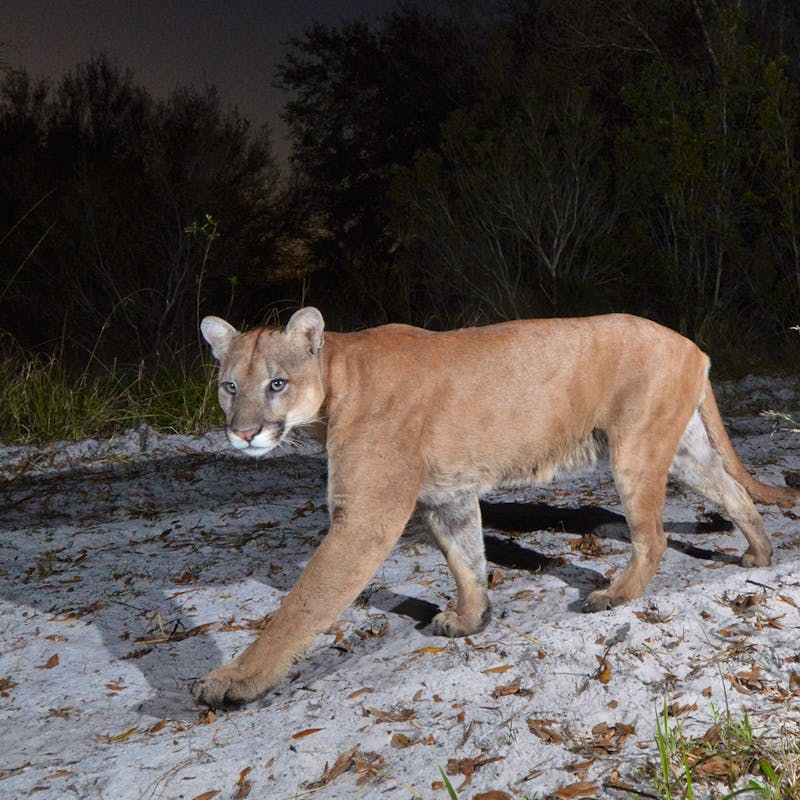On April 20, 2010, BP’s Deepwater Horizon oil rig exploded in the Gulf of Mexico, killing 11 of its workers and initiating a massive oil disaster that claimed the lives of thousands of birds, sea turtles, marine mammals and other wildlife. Now, a year later, the Gulf is still reeling from the disaster.
Oil continues to wash up on beaches and contaminate wildlife refuges. A slew of baby dolphin deaths could mean the loss of an entire generation of marine mammals, and a suspicious rise in sea turtle strandings could leave the survival of some species hanging in the balance. Coastal communities that rely on fishing and tourism have yet to get back on their feet. Recovery is only just beginning.

Defenders is fighting to protect sea turtles, pelicans, dolphins, and other wildlife still threatened by the Gulf oil disaster.
Shortly after the tragedy began to unfold, Defenders dispatched several wildlife experts, including our executive vice president Jamie Rappaport Clark, to the Gulf to bear witness to the tragedy. Our goal was to determine the best ways for us to help protect the wildlife and natural habitats that were harmed by the toxic oil and chemical dispersants that filled Gulf waters. With a year gone by and the long road to recovery stretched before us, we are committed to standing by the region every step of the way.
Here’s what Defenders is doing:
On the Ground
Over the past 10 months, Defenders’ chief scientist, Chris Haney, has been conducting what is now the most extensive sea bird survey ever performed in the Gulf of Mexico. The information collected on the water will revolutionize the way we measure the impacts of oil spills on birds in the future. Later during this year and into 2012, Dr. Haney will host training workshops to help countries in the Caribbean and Mexico anticipate and prepare for the damage an oil spill could cause to their migratory bird populations.
In Florida, Defenders is working to put a state constitutional amendment banning oil drilling within state waters on the ballot in an upcoming general election. By working to raise the 700,000 signatures needed to get the drilling ban on the ballot, we will empower the people of the state to protect their communities, livelihoods and unique wildlife from the dangers of offshore drilling.
Under the Water
From just below the surface all the way to the sea floor, the oil spill impacted wildlife throughout the Gulf of Mexico water column. Defenders’ coral scientist, Dan Thornhill, was in the middle of a deep-sea study when the disaster struck the Gulf. He and his team of researchers are now working to process data gathered a mile below the surface before, during and after the spill to see how deep-sea animals and ecosystems fared after exposure to massive amounts of oil and chemical dispersants. The situation looks bleak, but only by learning more about the unique creatures of the deep ocean can we know the full extent of the damage.
It will take years, maybe even decades, for the Gulf of Mexico to fully recover from this horrific oil disaster. But Defenders won’t give up until the job is finished.
In Washington
A year since the Deepwater Horizon blowout, Congress has yet to pass meaningful oil spill prevention and response legislation. Defenders has mobilized tens of thousands of caring wildlife supporters to send hundreds of thousands of messages to Congress and the Obama Administration with one goal: to prevent the next oil disaster and ensure protections for wildlife impacted by the Deepwater Horizon tragedy and other oil spills. We continue to be a voice for the wildlife and coastal communities in the Gulf region as we work to ensure that the risky offshore industry operates in the context of our national interest moving forward and accepts full financial liability for its mistakes.
In the Courts
Defenders is working to make sure that BP is held accountable for the devastation it caused to wildlife and natural habitats in the Gulf region, and to prevent a tragedy like this from ever happening again. We are speaking up for the threatened and endangered wildlife illegally harmed as a result of this tragedy as well as seeking changes to the environmental review and permitting process for offshore drilling to make sure we predict, assess and stop environmental harm before it happens.
Planning Restoration
Defenders has been very active in the process to determine which efforts will be the most critical as the real work to rehabilitate and restore the Gulf region begins. We have attended Restoration Task Force meetings in the Gulf and are engaged in the Natural Resource Damage Assessment process, which is working to determine the full extent of harm done to natural resources in the region and how they may be properly restored.
It will take years, maybe even decades, for the Gulf of Mexico to fully recover from this horrific oil disaster. But Defenders won’t give up until the job is finished—our wildlife and wild places are too important.
Help Save Gulf Wildlife
Here are a few ways you can make a difference for the sea turtles, dolphins, pelicans, whales, and other wildlife still threatened by the oil disaster.
 Make a Memorial Adoption
Make a Memorial Adoption
Adopt a dolphin or sea turtle from the Defenders Wildlife Adoption Center. Your adoption will help support our wildlife-saving work.
Take Action to Stop the Next Oil Disaster
Send a message to Congress, urging them to heed the lessons of the BP oil disaster and stop dirty drilling practices that threaten our wildlife.
Text GULF to 90999 to Donate $10
Make a donation from your mobile phone.
$10.00 donation to Defenders of Wildlife. Charges will appear on your wireless bill, or be deducted from your prepaid balance. All purchases must be authorized by account holder. Message and Data Rates May Apply. Text STOP to 90999 to STOP. Text HELP to 90999 for HELP. Full Terms: www.mGive.org/T. Privacy Policy



